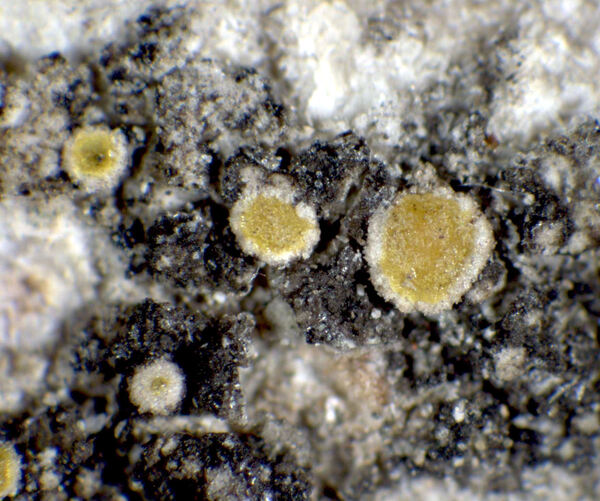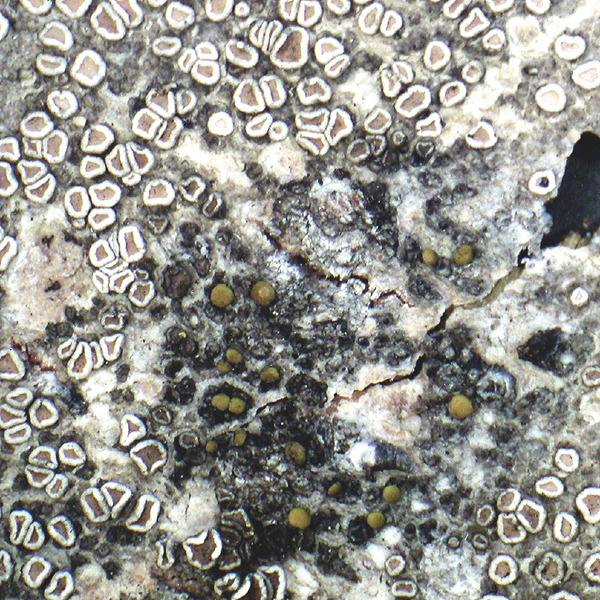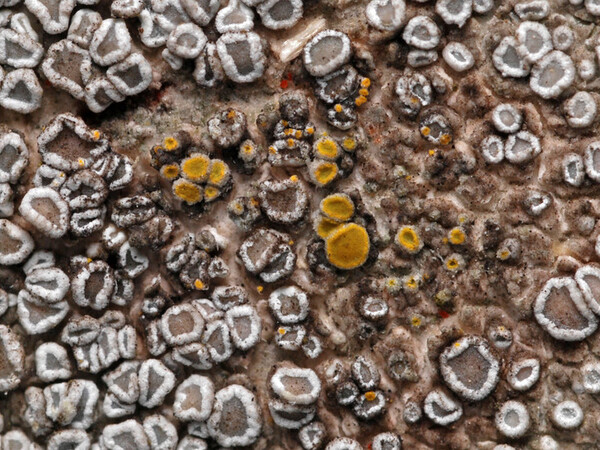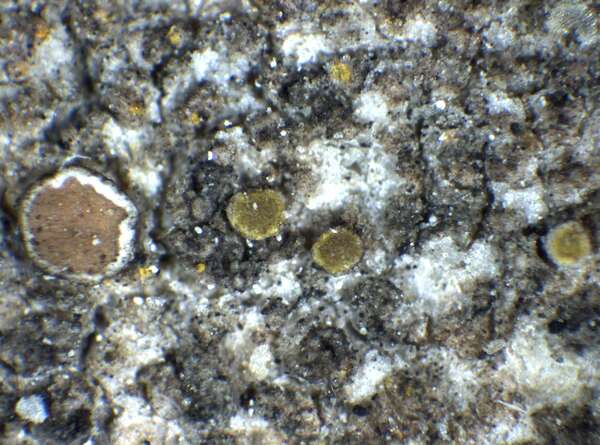Candelariella superdistans (Nyl.) Malme
Svensk Bot. Tidskr., 4: 164, 1910. Basionym: Lecanora superdistans Nyl. - Flora, 62: 355, 1879.
Synonyms:
Description: Thallus mostly inapparent, rarely finely granulose and grey to almost black, growing on the thalli and apothecial margins of Polyozosia populicola. Apothecia lecanorine, small, 0.2-0.8 mm across, with a flat to convex, yellow disc and a thin, concolorous, smooth, finally often excluded margin. Thalline exciple prosoplectenchymatous, with protruding hyphae; epithecium yellow, granular; hymenium colourless, 50-60 µm high; paraphyses mostly simple or sparingly branched in upper part, the apical cells lightly swollen; hypothecium colourless. Asci 8-spored, clavate, with an apical dome which is I+ blue only in the internal, lower part, interrupted in the centre by an I+ paler blue strip, Candelaria-type. Ascospores 1-celled, hyaline, ellipsoid, (12-)13-20(-22) x 5-7 µm. Photobiont chlorococcoid. Spot tests: apothecia K- or K+ reddish-orange, C-, KC-, P-. Chemistry: apothecia with pulvinic acid derivatives.
Growth form: Crustose
Substrata: bark
Photobiont: green algae other than Trentepohlia
Reproductive strategy: mainly sexual
Most common in areas with a humid-warm climate (e.g. most of Tyrrenian Italy)
paras Lecanora populicola
Commonnes-rarity: (info)
Alpine belt: absent
Subalpine belt: absent
Montane belt: very rare
Dry submediterranean belt: absent
Humid submediterranean belt: absent
Padanian area: absent
pH of the substrata:
1 2 3 4 5
Solar irradiation:
1 2 3 4 5
Aridity:
1 2 3 4 5
Eutrophication:
1 2 3 4 5
Poleotolerance:
0 1 2 3
Altitudinal distribution:
1 2 3 4 5 6
Rarity
absent
extremely rare
very rare
rare
rather rare
rather common
common
very common
extremely common
Loading data...
Occurrence data
Predictive map
Growth form: Crustose
Substrata: bark
Photobiont: green algae other than Trentepohlia
Reproductive strategy: mainly sexual
Most common in areas with a humid-warm climate (e.g. most of Tyrrenian Italy)
paras Lecanora populicola
Commonnes-rarity: (info)
Alpine belt: absent
Subalpine belt: absent
Montane belt: very rare
Dry submediterranean belt: absent
Humid submediterranean belt: absent
Padanian area: absent
pH of the substrata:
| 1 | 2 | 3 | 4 | 5 |
Solar irradiation:
| 1 | 2 | 3 | 4 | 5 |
Aridity:
| 1 | 2 | 3 | 4 | 5 |
Eutrophication:
| 1 | 2 | 3 | 4 | 5 |
Poleotolerance:
| 0 | 1 | 2 | 3 |
Altitudinal distribution:
| 1 | 2 | 3 | 4 | 5 | 6 |
Rarity
absent
extremely rare
very rare
rare
rather rare
rather common
common
very common
extremely common
Loading data...
Occurrence data
Predictive map










